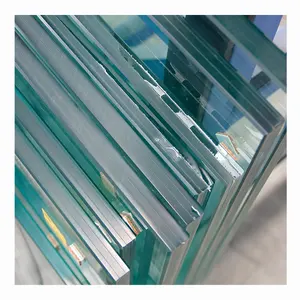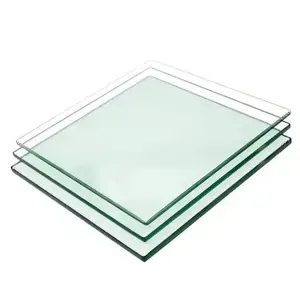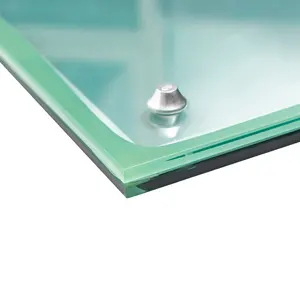What are Building Glasses
Building glasses are a fundamental component of modern architecture and construction, serving both functional and aesthetic purposes. These specialized glasses are used in various parts of a structure, such as windows, doors, facades, and interior partitions. They are meticulously engineered to provide insulation, strength, and safety while also enhancing the visual appeal of buildings. The target audience for building glasses includes architects, contractors, builders, and developers who require reliable materials for commercial and residential projects.
The principles underlying the function of building glasses revolve around the properties of the glass material itself. For instance, glass is chosen for its transparency, allowing natural light to penetrate interior spaces while offering protection from the elements. Additionally, certain building glasses are treated or combined with other materials to yield additional benefits such as thermal insulation, noise reduction, or resistance to impact. Technologies like double-glazing and lamination have revolutionized the use of glass in buildings by significantly improving its performance.
Building glasses can also be customized to meet specific requirements such as shape, size, color, and thickness. This customization ensures that each piece of glass perfectly complements the design and functional needs of a building. Moreover, advancements in manufacturing processes have made it possible to produce building glasses with coatings or films that provide UV protection, self-cleaning properties, or smart-tinting capabilities that adjust the light transmission electronically.
Types of Building Glasses
In the realm of construction and real estate development, building glasses come in various types to serve distinct purposes. Each type brings unique characteristics and benefits suitable for specific applications.
Float Glass: Often used as the starting point for other types of glass production, float glass is manufactured through a process where molten glass is floated on a bed of molten metal to create a uniform thickness and a smooth surface. It is commonly used in windows and doors due to its clarity and versatility.
Tempered Glass: Known for its safety features, tempered glass undergoes controlled thermal or chemical treatments to enhance its strength. Upon impact, it shatters into small granular chunks instead of jagged shards, making it ideal for areas where human safety is paramount.
Laminated Glass: This type consists of two or more glass sheets bonded together with an interlayer. Laminated glass is excellent for sound reduction and is often used in applications where security and safety are concerns due to its ability to hold together when broken.
Insulated Glass Units (IGUs): Typically composed of two or more panes separated by a vacuum or gas-filled space to reduce heat transfer across a part of the building envelope. IGUs are frequently employed in exterior windows and doors for their energy efficiency properties.
Coated Glass: Coated glasses come with a surface layer that reflects heat or controls light transmission. They're used in curtain walls and skylights for energy conservation and can also reduce glare within interior spaces.
How to choose Building Glasses
Choosing the appropriate type of building glass is crucial for ensuring both the performance and aesthetics of a structure align with the desired outcomes. Businesses should consider several factors when selecting building glasses for their projects:
Application: Identify where the glass will be used—whether for an office's interior partitions or an outdoor greenhouse—and ensure that the chosen type aligns with specific functional requirements such as privacy, safety, or energy efficiency.
Thermal Performance: For exterior applications like windows or curtain walls, consider insulated glass units that offer better energy performance by reducing heat loss in cooler climates or heat gain in warmer areas.
Safety Requirements: In areas prone to human activity or potential impact, tempered or laminated glasses should be considered due to their enhanced safety features. They're crucial for places like bathrooms, staircases, and entryways.
Acoustic Properties: If sound insulation is a concern, particularly in bustling urban environments or between different areas within a building (e.g., hotels), laminated glass can provide the necessary noise reduction.
Aesthetic Preferences: Apart from functionality, visual aspects play an essential role. Choose from tinted, frosted, etched, or stained glasses based on the design style—be it modern or traditional—that complements the overall architectural vision.
Best Building Glasses on Alibaba.com
Alibaba.com stands out as a leading online marketplace that caters to businesses worldwide seeking quality building glass options for their construction needs. With an extensive network of verified suppliers offering a diverse range of products across multiple categories, Alibaba.com provides an unparalleled selection of building glasses suitable for any project—big or small.
The platform simplifies global trade by connecting buyers with suppliers who can meet custom requirements while ensuring purchases can be made securely through services like Trade Assurance. This emphasis on creating tailored solutions underscores Alibaba.com's dedication to helping businesses find exactly what they need without compromising on quality or reliability.
Moreover, Alibaba.com’s user-friendly interface allows buyers to easily navigate through options based on specific project needs such as application type, material characteristics, design style preferences, and functional features like heat insulation or explosion-proof properties. With a commitment to facilitating seamless transactions and supporting small and medium-sized businesses in their growth endeavors, Alibaba.com stands as a trusted partner in sourcing high-grade building glasses that meet varied industry standards.
Common FAQs for Building Glasses
What are the key factors to consider when selecting building glass for a commercial project?
When choosing building glass for commercial projects, consider the application and location of the glass, energy efficiency requirements, safety regulations, acoustic properties, and aesthetic preferences specific to the project's design and functionality.
How does tempered glass differ from laminated glass?
Tempered glass is strengthened through thermal or chemical treatments and shatters into small chunks when broken, whereas laminated glass consists of layers of glass bonded with an interlayer and remains intact when damaged, providing additional safety and security.
What is insulated glass and why is it important?
Insulated glass units (IGUs) are made of two or more panes of glass separated by a gas-filled space to minimize heat transfer. They are crucial for energy conservation in building envelopes, helping to maintain consistent indoor temperatures and reduce energy costs.
Can building glasses provide adequate UV protection?
Yes, certain building glasses can be treated or coated to offer UV protection, reducing the amount of ultraviolet light that enters a space and protecting interior furnishings from fading.
What are some common applications of coated glass in construction?
Coated glass is often used in curtain walls, skylights, and windows to reflect heat, control light transmission, improve energy efficiency, and reduce glare within interior spaces.
How does the shape of building glass affect its application?
The shape of building glass—whether flat or curved—can influence its application by determining where it can be installed and what aesthetic or structural benefits it brings to a project, such as creating panoramic views or enhancing architectural design.
What are the advantages of using frosted or etched glass in commercial settings?
Frosted or etched glass is ideal for privacy while allowing light to pass through. It is commonly used in office partitions, bathroom areas, and places where confidentiality is important without sacrificing natural illumination.
Are there eco-friendly options available for building glasses?
Yes, eco-friendly options such as glasses made from recycled materials or those that contribute to energy efficiency are available and can contribute to sustainable building practices.
How do tinted building glasses impact the functionality of a space?
Tinted glasses can reduce solar heat gain and glare inside a building while adding a decorative element. They are suitable for regions with intense sunlight exposure and can contribute to a building's overall thermal performance.
What considerations should be made for acoustic insulation when selecting building glasses?
For acoustic insulation, one should consider laminated glasses with special interlayers designed to dampen sound transmission, which is especially important in environments like schools, hospitals, or offices that require quiet spaces.
Can building glasses be customized to fit specific design styles?
Building glasses can be customized in terms of size, color, texture, and treatment to fit various design styles such as modern, contemporary, traditional, Chinese, or minimalist aesthetics.
What role does thickness play in the selection of building glasses?
The thickness of building glasses affects their strength, insulation properties, and impact resistance. Thicker glasses are typically used in areas requiring higher safety standards or better thermal performance.







































 浙公网安备 33010002000092号
浙公网安备 33010002000092号 浙B2-20120091-4
浙B2-20120091-4